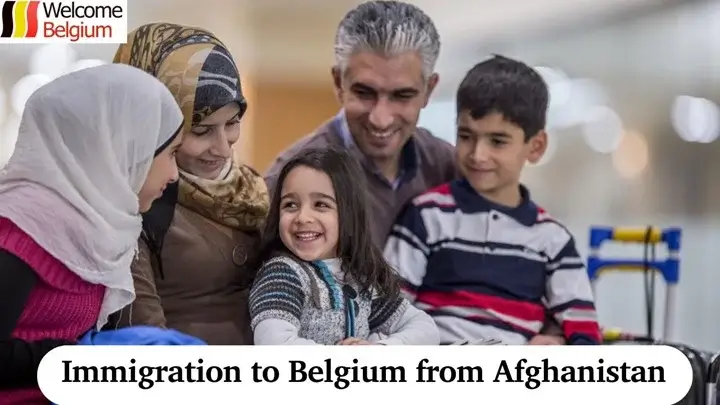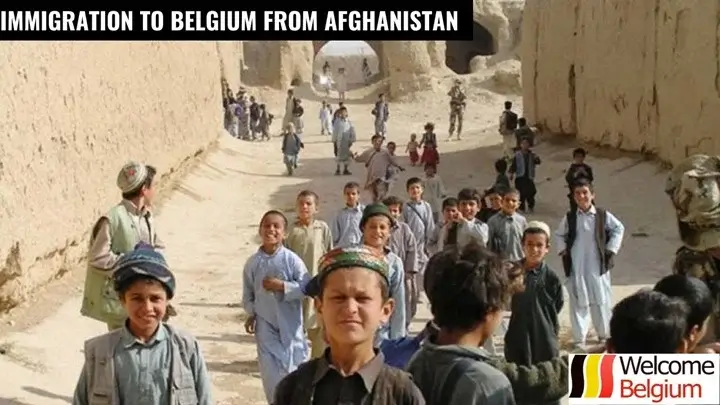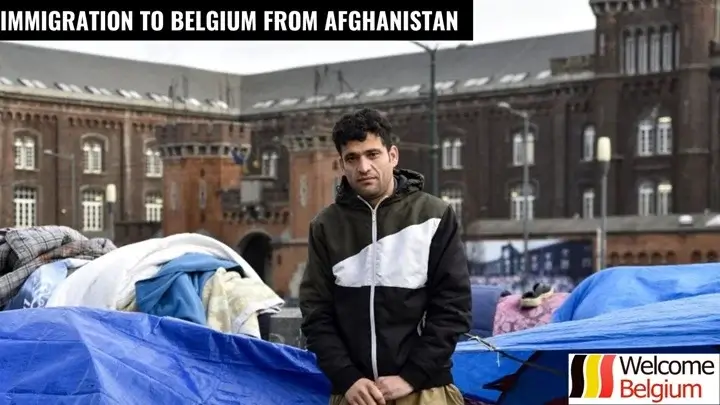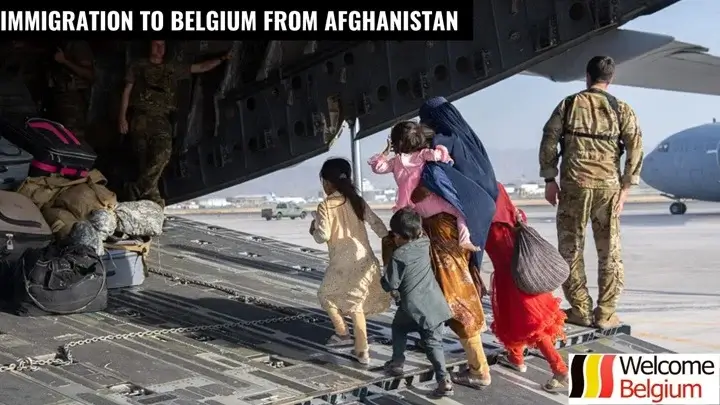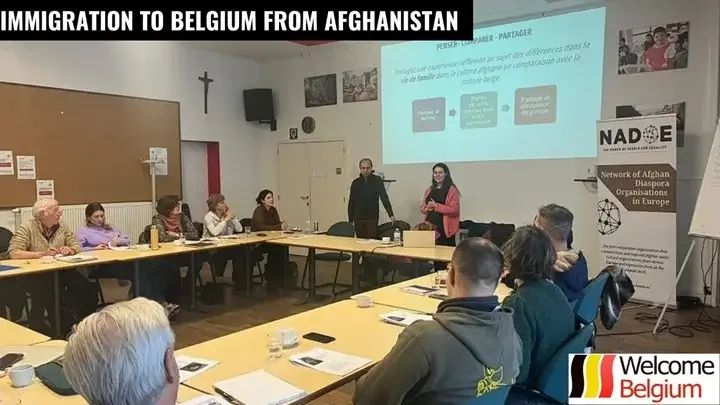Immigration to Belgium from Afghanistan has become one of the important directions in recent years, especially after the events of 2021, when the Taliban seized power. Thousands of Afghans are leaving their homeland in search of protection and a better future. Belgium, as one of the European countries, actively provides asylum to Afghan citizens, helping them to start a new life. However, on the way to integration, foreign seekers face many challenges that require support from both the state and civil organizations.
Belgium accepts refugees from Afghanistan
Following the events of 2021 and the Taliban takeover, thousands of Afghans were forced to flee their homeland in search of safety. Immigration to Belgium from Afghanistan has become particularly relevant at this time, when many countries have begun to evacuate vulnerable groups. Belgium, along with other European countries, is actively accepting Afghan refugees, providing them with the necessary support for integration and protection.
How Belgium is accepting refugees from Afghanistan:
- Evacuation flights: In August 2021, Belgium organized the evacuation of Afghan citizens who worked with international organizations, providing them with asylum.
- Temporary accommodation centres. Belgium provides temporary housing and basic conditions for newly arrived refugees.
- Social and legal support: Organizations such as Fedasil and the Red Cross provide assistance with asylum applications, medical care, and social integration.
- Integration programs: Include language courses and employment assistance to help refugees adapt more quickly to their new life in Belgium.
Immigration to Belgium from Afghanistan has become an important part of the country’s humanitarian mission aimed at protecting vulnerable populations. Belgium continues to support refugees, offering them opportunities for integration and long-term security. This process requires comprehensive support from both the state and public organizations.
Interesting fact:
In 2021, Belgium evacuated around 1,200 Afghan citizens, almost half of whom were children.
Asylum Process for Afghan Citizens
Immigration to Belgium from Afghanistan in 2025 continues to be a hot topic, especially for those seeking protection from instability and the threat of persecution in their home country. The asylum process in Belgium is based on strict international rules that ensure that all applicants are treated fairly and impartially. It is important for Afghan citizens to understand the steps involved in this process in order to prepare for it and increase their chances of successfully obtaining refugee status.
The process of obtaining asylum.
- Filing an application: Refugees must register with Belgian immigration services such as Fedasil.
- Preliminary interview: This is where the applicant’s initial background is collected, including the reasons for leaving their home country.
- Application review: Migration authorities such as CGRS conduct a detailed analysis of the case to determine whether the applicant meets the criteria for asylum.
- Decision: The applicant is either granted refugee status or is refused, with the possibility of appeal.
- In case of a successful outcome, the applicant receives assistance in integration through support and adaptation programs.
Immigration to Belgium from Afghanistan in 2025 requires careful preparation and awareness of all stages of the process. Despite the complexity of the procedure, Belgium continues to offer refugees effective legal and social support. It is important to remember that competent application for help significantly increases the chances of successfully passing all stages.
Advice:
Please contact qualified lawyers or immigration consultants to assist you with your case.
Afghan Immigration Statistics 2023-2024
In 2023, Afghan nationals continued to be one of the leading asylum seekers in Belgium. A total of 35,507 people applied for international protection, of whom 2,595 were Afghan nationals. This is the second highest number after Syria. At the same time, the vast majority of applicants from Afghanistan are men – 89%, reflecting the demographic composition of migration flows. In 2024, the trend continues, with Afghanistan remaining among the key countries from which a significant number of asylum seekers have arrived, along with Syria and Palestine.
Statistics Features:
- – In 2023, Afghanistan was the second largest host country for refugees in Belgium.
- – 26% of all minor asylum seekers in Belgium were also from Afghanistan.
- – 89% of applicants from Afghanistan are men.
- – The number of repeat applications from Afghans remains high, which is due to political instability in the region.
Immigration to Belgium from Afghanistan remains a hot topic for the authorities, given the significant number of young and vulnerable refugees. The statistics for 2023-2024 highlight the need to strengthen support for young people and family migrants. It is important to continue to develop integration programs and provide long-term assistance for the successful adaptation of these groups.
Advice:
If you are planning to immigrate to Belgium from Afghanistan, it is important to familiarize yourself with the current refugee support system and integration programs available to young people and family migrants.
The challenges faced by Afghan refugees
Immigration to Belgium from Afghanistan has become a forced measure for many in search of safety and a new life. However, refugees face a number of serious difficulties when trying to adapt to new conditions. From a lack of housing to language barriers, each obstacle requires time and resources to overcome. Successful integration requires support from both the state and local communities.
Main difficulties:
- Housing problems: Many refugees are forced to wait for permanent housing in overcrowded accommodation centres.
- Language barriers: Many Afghans do not speak French or Dutch, making it difficult to integrate into society and find work.
- Lack of employment. Without language skills and proof of qualifications, it is difficult to find a job, which often leads to social isolation and financial problems.
- Access to health services: Despite the availability of basic health care, many refugees face difficulties in obtaining specialized care.
- Psychological pressure: Many Afghans experience traumatic events, which are compounded by difficulties in adapting to a new life.
Immigration to Belgium from Afghanistan is a long and difficult adaptation process for many. Every difficulty – from basic living conditions to social integration – requires time and considerable effort. It is important that refugees receive comprehensive support from society to ease this transition.
Advice:
To successfully integrate, Afghan refugees should begin learning the language as soon as possible and actively use the support of local organizations.
Organizations supporting Afghan immigrants
Immigration to Belgium from Afghanistan in 2025 remains a hot topic, especially for those seeking asylum and a new start. Refugees face numerous challenges, including language barriers, finding housing and integrating into local society. There are various organizations to support Afghan immigrants, helping with legal, social and domestic issues. These organizations play an important role in the adaptation process and provide the necessary assistance at all stages of immigration.
Organizations supporting Afghan immigrants:
- Phone: +32 2 213 44 11. Website : https://www.fedasil.be. Address : Rue des Chartreux 21, 1000 Bruxelles, Belgium. Fedasil is a government service responsible for the reception and support of refugees and asylum seekers. It provides temporary housing, financial support, as well as legal and social services, helping refugees adapt to life in Belgium.
- Belgian Red Cross. Phone: +32 2 371 31 11. Website : https://www.redcross.be. Address : Rue de Stalle 96, 1180 Bruxelles, Belgium. The Belgian Red Cross is actively involved in helping refugees and asylum seekers, providing humanitarian aid, medical services, as well as integration and education programs.
- Caritas International. Phone: +32 2 229 36 11. Website: https://www.caritasint.be. Address: Rue de la Charité 43, 1210 Bruxelles, Belgium. Caritas International is a charity that provides assistance to people in need, including refugees. They offer legal support, help finding housing, and access to social services for integration.
- Luchtelingenwerk Vlaanderen. Phone: +32 2 225 44 00. Website: https :// www. vluchtelingenwerk. be. – Address: Kruidtuinstraat 75, 1210 Sint – Joost – ten – Node, Belgium. This organization defends the rights of refugees and provides them with the necessary services, including asylum advice, access to education and vocational training.
- Plateforme Citoyenne de South aux Refugees. Phone: +32 2 223 12 15. Website : https://www.bxlrefugees.be. Address : Rue de la Senne 2, 1000 Bruxelles, Belgium. This platform brings together various groups and organizations to support refugees. It organizes housing and volunteer programs aimed at integrating migrants into society.
Supporting Afghan immigrants in Belgium remains an important task, and the organizations presented above provide comprehensive assistance to these people. In 2025, the need for their services increases as the number of asylum applications increases. Effective cooperation between state and public structures helps Afghans to adapt faster and start a new life in a safe environment.
Advice:
Contact local volunteer and human rights organizations immediately upon arrival in Belgium to speed up the integration process.
In 2025, the prospect of immigration to Belgium from Afghanistan will remain an important topic, especially in the context of ongoing conflict and instability in the region. Belgium, like other European countries, will continue to support refugees, but will need to adapt its approaches to integration to cope with growing challenges, such as the increase in asylum applications and the need for social assistance. It is expected that governmental and non-governmental organizations will actively cooperate to provide more effective support programs, which will help Afghan immigrants adapt to their new life more quickly. It is important to remember that successful integration depends on a comprehensive approach, including legal, social and psychological support.

